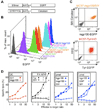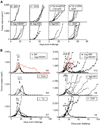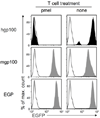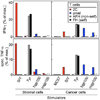Relapse or eradication of cancer is predicted by peptide-major histocompatibility complex affinity
- PMID: 23597565
- PMCID: PMC3658176
- DOI: 10.1016/j.ccr.2013.03.018
Relapse or eradication of cancer is predicted by peptide-major histocompatibility complex affinity
Abstract
Cancers often relapse after adoptive therapy, even though specific T cells kill cells from the same cancer efficiently in vitro. We found that tumor eradication by T cells required high affinities of the targeted peptides for major histocompatibility complex (MHC) class I. Affinities of at least 10 nM were required for relapse-free regression. Only high-affinity peptide-MHC interactions led to efficient cross-presentation of antigen, thereby stimulating cognate T cells to secrete cytokines. These findings highlight the importance of targeting peptides with high affinity for MHC class I when designing T cell-based immunotherapy.
Copyright © 2013 Elsevier Inc. All rights reserved.
Conflict of interest statement
The authors have no conflict of interests.
Figures






Comment in
-
It's the peptide-MHC affinity, stupid.Cancer Cell. 2013 Apr 15;23(4):429-31. doi: 10.1016/j.ccr.2013.04.004. Cancer Cell. 2013. PMID: 23597560
References
-
- Antony PA, Piccirillo CA, Akpinarli A, Finkelstein SE, Speiss PJ, Surman DR, Palmer DC, Chan CC, Klebanoff CA, Overwijk WW, et al. CD8+ T cell immunity against a tumor/self-antigen is augmented by CD4+ T helper cells and hindered by naturally occurring T regulatory cells. J Immunol. 2005;174:2591–2601. - PMC - PubMed
-
- Assarsson E, Sidney J, Oseroff C, Pasquetto V, Bui HH, Frahm N, Brander C, Peters B, Grey H, Sette A. A quantitative analysis of the variables affecting the repertoire of T cell specificities recognized after vaccinia virus infection. J Immunol. 2007;178:7890–7901. - PubMed
Publication types
MeSH terms
Substances
Grants and funding
LinkOut - more resources
Full Text Sources
Other Literature Sources
Medical
Molecular Biology Databases
Research Materials

